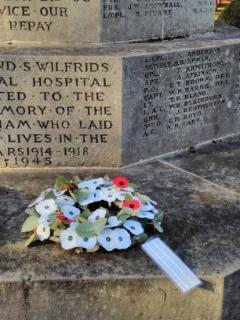Peace Vigil, Hexham Abbey
Saturday, November 11, 2017: Peace Vigil, Hexham Abbey
We were delighted to have been invited back to join our friends in Hexham for their annual peace vigil. This is the text of the reflection shared by Kath Wade, on behalf of the Martin Luther King Peace Committee:
Back in the 1950s, Dr Martin Luther King Jr said:
In the light of the fact that the oppressed people of the world are rising up against oppression, the question is this: ‘How will the struggle for justice be waged?’ And I think that is one of the most important question confronting our generation. As we move to make justice a reality on the international scale, how will the struggle be waged? It seems to me that there are two possible answers to this question. One is to use the all too prevalent method of physical violence. And it is true that man throughout history has sought to achieve justice through violence. And we all know the danger of this method. It seems to create many more social problems than it solves. And it seems to me that in the struggle for justice, this method is ultimately futile. There is still a voice crying into the vista of time saying to every potential Peter, put up your sword. And history is replete with the bleached bones of nations and communities that failed to follow this command. Non-violence is absolute commitment to the way of love. Love is not emotional bash; it not empty sentimentalism. It is the active outpouring of one’s whole being into the being of another.
In November 1967, having been awarded an honorary degree by Newcastle University, he concluded his acceptance speech by drawing on the Biblical prophet Amos with the following words: “With this faith we will be able to transform the jangling discords of our nation, and all the nations of the world, into a beautiful symphony of brotherhood and speed up the day when all over the world justice will roll down like waters and righteousness like a mighty stream.”
Little has changed in the last fifty years. Dr King’s words ring true to this day – we still face the three evils of war, poverty and racism. There is an urgent need for recognition of our interconnectedness, our mutuality.